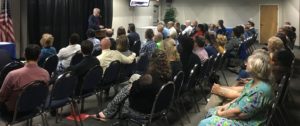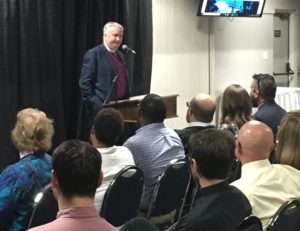Keeping things positive is always a goal for committee members of the BACAM (Bishop’s Advisory Committee for Aspirants to Ministry) Conference. When an aspirant wants to discover more about a perceived calling to pursue possible ordination to the priesthood or diaconate, he or she will receive feedback in an upbeat way.
“We are looking to find out how they can best serve,” said Orman Kimbrough, the chairman of the Commission on Ministry (COM), whose members constitute the BACAM committee that assesses candidates. “We won’t say, ‘No, you can’t be a deacon or a priest. We’ll say, laity, yes.’”
That positive approach has helped the BACAM Conference reaffirm the calling of dozens of discerners since its inception in 1996. This year, 17 aspirants – nine men and eight women – along with their spouses, attended the 2019 BACAM Conference on March 4-5 at the Canterbury Retreat & Conference Center in Oviedo.
More than 40 people were a part of the process this year. A total of 24 people sat on the committee. Of those individuals, approximately half are ordained, and half are lay people, Kimbrough said. The ordained committee members are split fairly evenly between priests and deacons.
Aspirants are assessed in numerous areas at BACAM. Committee members use prayer, group observation, group discussion questions, interviews, social interaction and more to gauge whether attendees are discerning a call to lay or to ordained ministry.
“The spiritual maturity has increased year by year over the last five to seven years,” Kimbrough said. “It’s positive.”
Kimbrough said aspirants are a broad range of ages, but “they are younger to a higher degree than they were 10 years ago.”
Of the 17 aspirants, 10 were there for discernment to priesthood, and seven for the diaconate, according to the Rev. Canon Dr. Justin Holcomb, Canon for Vocations.

The 2019 BACAM Conference on March 4-5 drew 17 aspirants and their spouses to the Canterbury Retreat & Conference Center in Oviedo.
The BACAM Conference follows up on the Conference on Ministry, held last summer at Church of the Messiah in Winter Garden. The Conference on Ministry helps those who are discerning a call to serve God – as lay ministers or possibly as ordained ministers in the diaconate or priesthood – meet with, hear from and have the opportunity to ask the bishop, the canons and archdeacon, and members of the commission questions about what discernment and training is required. After this conference, aspirants, in consultation with their rector or vicar, submit a nomination/application form to enter the diocesan discernment process.
Kimbrough said aspirants work with a Parish Discernment Committee (PDC) to help gauge their calling for service. “There are usually five to seven people on the PDC,” he said. “The aspirant spends anywhere from eight to 10 weeks working with them. There might be seven sessions of meetings together, for about 1 ½ hours each.”
The PDC, in turn, then forwards their recommendation to Bishop Greg Brewer and to the Commission on Ministry. BACAM, in turn, makes their recommendations to Brewer at the end of the conference. Kimbrough said Brewer usually makes a decision on recommendations and communicates that decision to each aspirant in two to four weeks.
“We work with the aspirants to help them in their discerning their call to service,” Kimbrough said, “whether it’s lay ministry or ordained ministry as a deacon or priest. The goal is to help provide information to them and to provide recommendations to Bishop Brewer.”
Kimbrough said Brewer, Holcomb and Archdeacon Kristi Alday attended the BACAM Conference to talk with aspirants but are not members of the committee. Kimbrough also praised diocesan staff executive assistants Marilyn Lang and Ellen Ceely for their hard work at BACAM.
“The event went well, overall,” Holcomb said.
– Marilyn Lang contributed to this story.
PHOTOS PROVIDED BY THE DIOCESE OF CENTRAL FLORIDA

